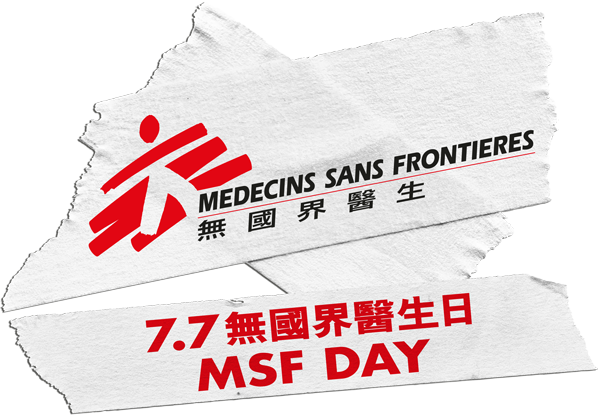Field Stories
Natural disasters, malnutrition, and malaria Madagascar’s triple crisis under climate change
The vulnerable island nation amidst a climate crisis
Masy came to the MSF-supported clinic with her grandchild who was suffering from a high fever and convulsions. “We all know that life is very hard today. Most of our produce was destroyed by the cyclone and we have nothing left,” Masy said.
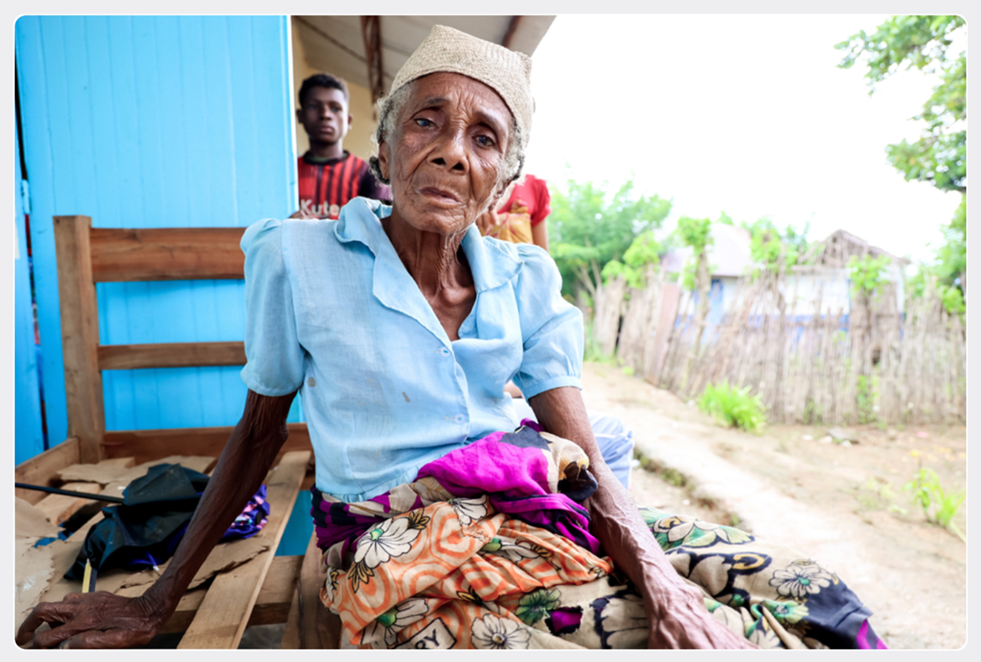
Masy came to the MSF-supported clinic with her grandchild who was suffering from a high fever and convulsions.
Madagascar is an island nation east of the African continent. It is also one of the world’s poorest countries, with 80% of the population living below the poverty line.
Every year during the cyclone season, violent storms from the Indian Ocean often hit this exposed island nation. As climate change intensifies, storms absorb huge amounts of energy in warm water, forming superstorms with astonishing destructive power.
In March 2023, Cyclone Freddy made landfall head-on in Madagascar. Unlike most cyclones, it formed in the northwestern waters of Australia. In the 37 days between its formation and dissipation, Freddy became the longest-lived tropical cyclone ever recorded and was officially Earth’s most energetic storm ever observed. It was estimated that 148,000 people needed humanitarian assistance following Cyclone Freddy.
Malnourished children struggle for their lives
Unfortunately, Freddy hit the southern region where people still suffer the impact of last year’s cyclones. They destroyed 80% of crops, leaving people without income and food, with children struggling from malnutrition. Freddy’s arrival only aggravated the already dire situation. In the first four months of 2023, MSF-supported treatment centres admitted over 1,200 children under five years old suffering from severe acute malnutrition.
Genevia, a 19-year-old mother, arrived at the MSF-supported clinic with her twin babies, who received treatment for malnutrition. “Our rice plantation was flooded, and the water level was increasing a lot. Now it is full of sand, and we are out of food," she said.
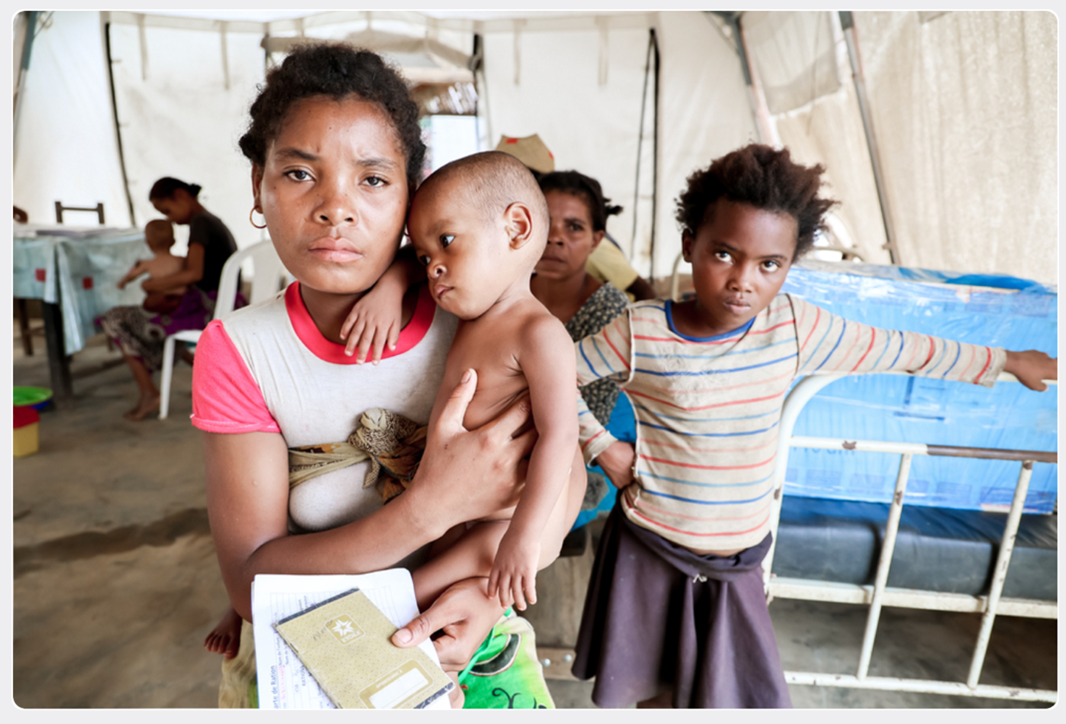
Genevia is 19 years old. Cyclones completely ruined her family’s rice crops, and her twin babies were malnourished.
Malaria runs rampant after the typhoon
Changes in temperature and rainfall have resulted in floods and significant heat waves that change the behaviour and survival of the anopheles mosquitoes which spread malaria. Last year, there were more than 2.8 million malaria cases - an alarming surge from the 1.7 million cases recorded in 2022.
Masy took her grandchild who was suffering from a Malaria-induced fever. She said “Malaria is not the same today. Now, malaria is very severe. Not only for kids but even for ourselves. You can be affected. Malaria is happening to everyone.”
Poor road conditions block access to healthcare
The peak malaria season coincides with the cyclone and rainy season. Strong winds and heavy rains often wash away roads and bridges, and most roads become muddy. The weather makes it extremely difficult for people to get any health care.
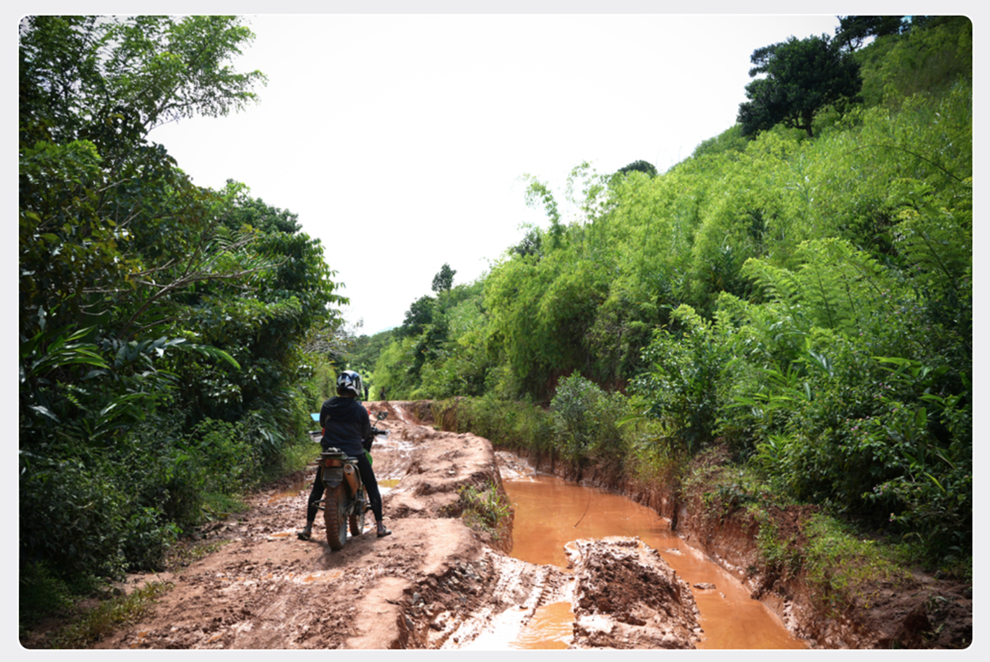
During the cyclone and rainy season, the weather makes most roads in Madagascar muddy and extremely difficult for people to get to health care.
Soanary lives in the remote southeastern region of Ikongo. Her 4-year-old son suffers from malnutrition and malaria. "I got worried after seeing my son's condition deteriorate. Then I carried him on my back, walked for four hours, and crossed the water to get to this health centre,” she said. “I only hope that one day he will be fit and able to play like all his friends.”
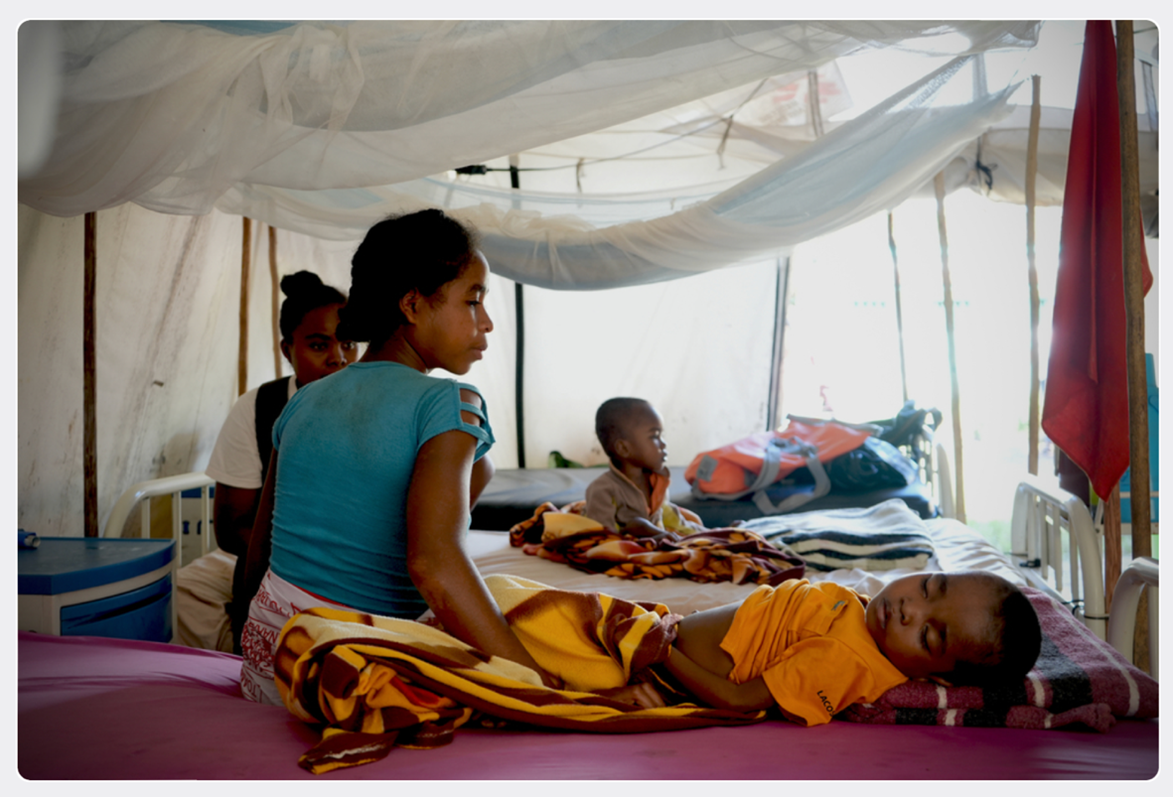
Soanary, the mother of a 4-year-old boy suffering from malnutrition and malaria. She carried her son on her back, walking for four hours, and crossing through water to an MSF-supported clinic.
For some people, the treacherous journeys stop them from seeking health care until it is life-threatening. To deal with these problems, MSF teams have launched mobile clinics using boats, cars, and motorbikes to ensure remote communities can safely access care.
MSF increased activities to combat the malnutrition and malaria crises
In response to food insecurity made worse by climate change, MSF teams have increased activities in the southern part of the country, which has been the most affected. There is more nutritional screening for children under 5 years old.
For instance, MSF supports seven primary health centres and two intensive nutritional clinics in the Ikongo district. Between 2022 and March 2024, MSF medical teams working with Malagasy health authorities and health promoters diagnosed and treated 2,205 children suffering from both malnutrition and malaria, including 256 cases this year.
Climate scientists warn that extreme weather conditions related to climate change are predicted to increase, with Madagascar remaining a vulnerable target. A likely rise in natural disasters, malnutrition, and malaria poses a triple crisis, to which the Madagascans desperately require your attention and support.
Stranded in a desolate town Two million people uprooted from their homes in Burkina Faso, West Africa
Imagine being in a town with no way in or out. At the same time, food and supplies are running low...
In the landlocked West African country of Burkina Faso, the defense forces have been at war with armed groups. Dozens of towns and cities have been surrounded and cut off by the groups, who lay mines and other explosive devices around them. No one is allowed in or out, vehicles are checked and anyone daring to defy their orders is attacked. Residents of neighboring villages are driven away and even killed, resulting in nearly two million Burkina Faso people being displaced.
A two-year-long blockade on Djibo left 300,000 facing severe shortages
The northern town of Djibo has been one of the conflict hot spots and under blockade for more than two years. At the moment, more than 300,000 people are trapped. Resources like food, water and electricity have become extremely limited, to the extent that some people have resorted to eating leaves. Last year, more than half of the people trapped were children, many of whom were malnourished.
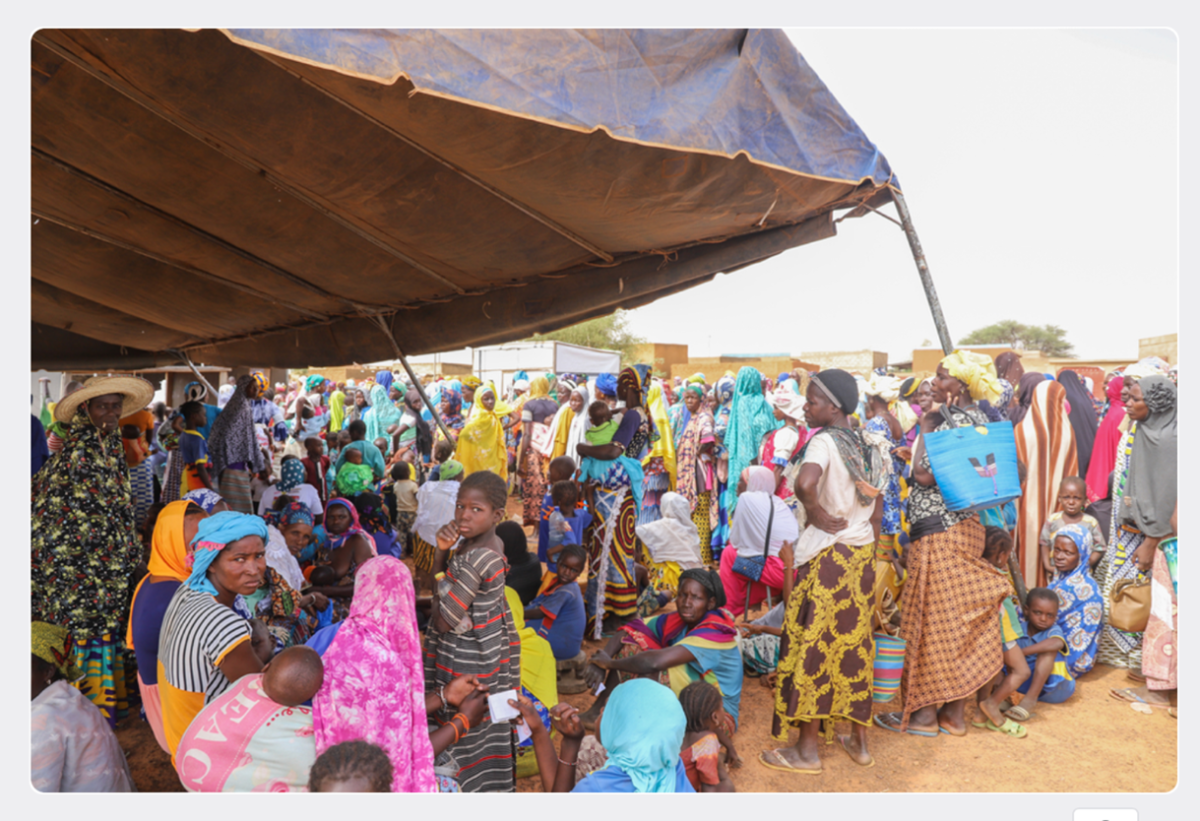
Conditions are desperate for the third of a million people trapped in Djibo.
“To stay away from the conflict, my family and I left the village of Yalanga, 100 km from Djibo. My husband was killed on the way by armed groups,” said Safi, a 30-year-old internally displaced mother of five. “We made it to the refugee camp in Djibo, only to find out the city was under lockdown, and now I had nothing left to eat for my children."
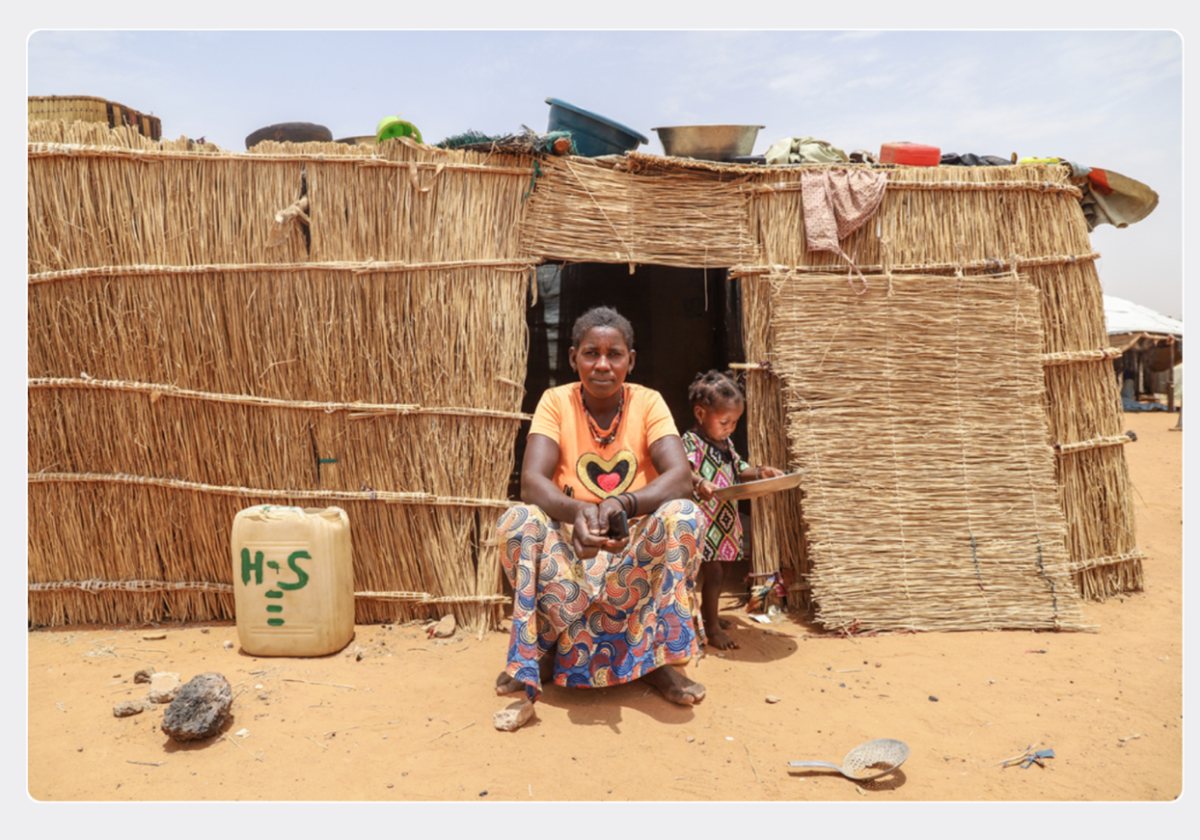
Escaping the conflict, Safi took her five children 100 km away from home to Djibo. Her husband was killed on the way, and Djibo is now under blockade.
BP-5 Biscuits: A ray of hope for malnourished children
In April 2023, Safi finally saw hope. MSF teams successfully delivered 57 tonnes of BP-5 biscuits to Djibo, distributing them to 12,456 children aged between 6 months and 5 years. BP-5 biscuits are fortified foods with high energy value based on cereals: cooked wheat flour, fat, vegetable oil, sugar, soya protein, vitamins, and minerals. This distribution temporarily contributed to the immediate needs.
MSF is also working on rehabilitating water points and building boreholes, providing almost 200m³ of drinking water a day for the inhabitants, while reducing risks for women who no longer need to walk long distances to fetch water.
However, transporting relief supplies is no small feat for humanitarian organizations. The convoy needs an armed escort from the army before it can arrive safely. Sometimes, no supplies can be transported to the area for up to four months. As the volatile situation unfolds, no one knows when the next convoy will arrive.
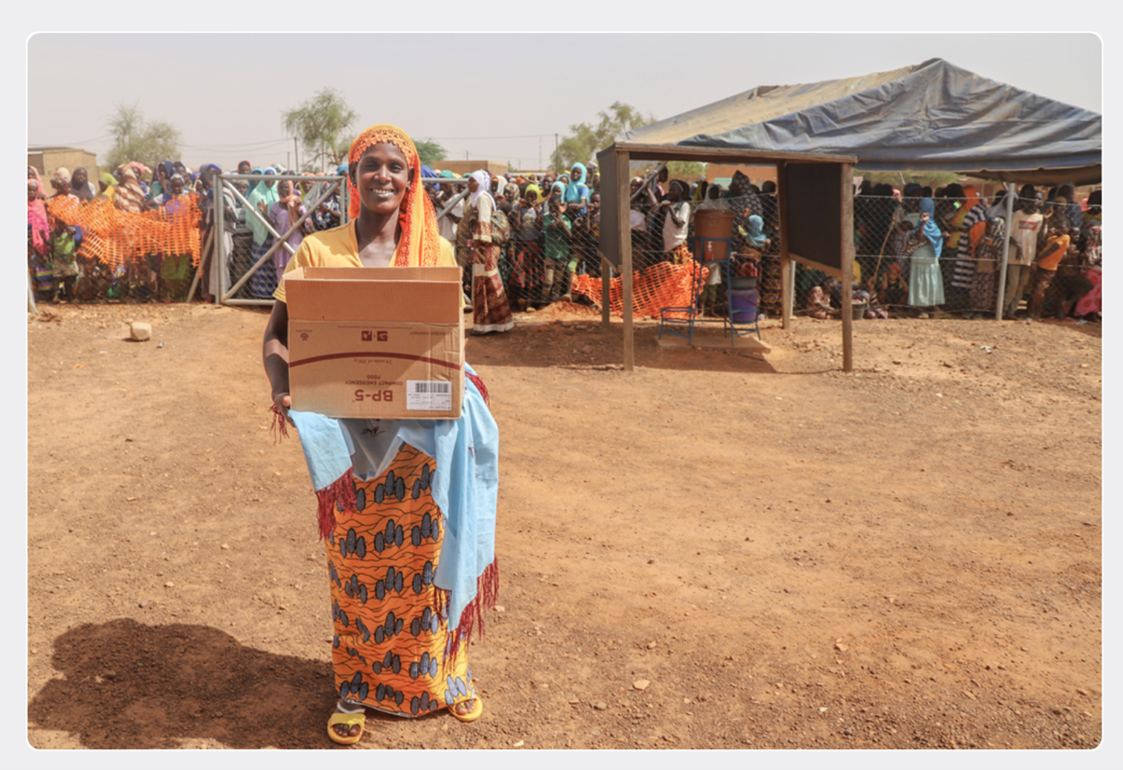
After four months, relief supplies finally arrived in Djibo again. A smiling mother holds a box of fortified food distributed by MSF, enough to meet her children's needs for a month.
A near-vacuum that lacks medical staff and medication
Because they are severely understaffed and undersupplied, many health facilities have either been forced to close or operate at minimum capacity, leaving an already vulnerable population in a near medical vacuum.
MSF in collaboration with the Ministry of Health has been supporting Djibo medical centre with a surgical unit, two advanced health posts, and three community health sites. The surgery and the emergency care unit are self-powered thanks to solar panels installed by MSF.
Intense blockade in Tougan, MSF targeted
Djibo is merely one of many besieged towns. The northwestern town of Tougan has been subject to an even worse blockade. An armed group has surrounded the town and cut off supply routes and main roads, and all vehicles are checked.
In February 2023, a clearly identified MSF vehicle was carrying a four-person medical team on the road to Tougan when it was targeted by armed men who shot at the passengers. Two MSF staff members were killed, and MSF has since suspended activities in this region.
MSF turns to airlift to provide relief after land routes are blocked
After eight months, MSF teams were able to bypass the land blockade in Tougan through humanitarian flights set up by UNHAS (United Nations Humanitarian Air Service), to assess the medical needs of its inhabitants – both local and displaced people. MSF teams went door-to-door in neighbourhoods sheltering the most displaced people, screening children for malnutrition. Almost 20% have some form of acute malnutrition. Just under 10% are suffering from its most severe form.
Despite the challenges ahead, MSF will continue to assist Tougan, including flying in drugs and stocks of ready-to-use therapeutic foods, supporting community health workers and activities in health centres, and increasing bed capacity to admit and treat the sickest children.
"We are living in great suffering", said one community leader.
Stranded in desolate towns, people in Burkina Faso are surrounded by hunger, fear, and desperation, waiting for attention and help from the world.
1000 Days of War in Ukraine 1000 Cuts on Ukrainian Bodies and Minds
In February 2022, when the full-scale escalation of the war began, all eyes were on Ukraine. By now, it has been over a thousand days since war broke out. While global attention has waned, the destruction caused by the fighting is still spreading.
Moreover, numerous medical facilities near the front lines were continuously targeted.For example, in the southern region of Kherson, 80% of medical facilities were either destroyed or damaged.
“How many times must we see the same thing? What will it take for those manning the guns to show a shred of respect for human life?” - Cyril Cappai, MSF Head of Mission
As a result, the places with the most patients are also where medical care is most vulnerable. The key to reducing casualties is promptly transferring patients to safe medical facilities for treatment.
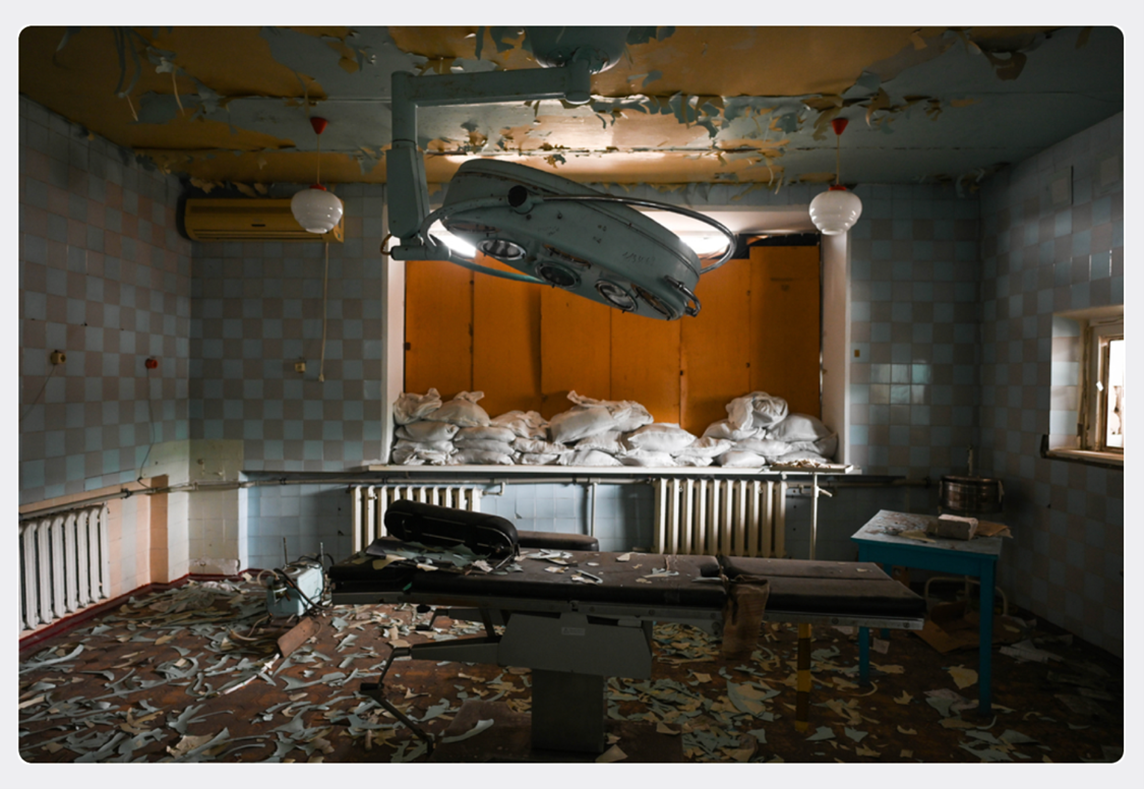
A Ukrainian hospital destroyed by war.
Relocating patients with medical trains and ambulances
Since the war intensified, MSF has been conducting medical evacuation work. Short-distance transfers can be completed using ambulances. But when there is a large-scale military operation and patients are many, how can they be quickly transported to distant medical facilities?
Trains seem to be the most sensible option.
On the medical train operated by MSF, the carriages have been converted into wards, with medical teams on duty - just like a miniature mobile hospital that can transport over a hundred patients from the eastern front line to the relatively safe central and western regions.
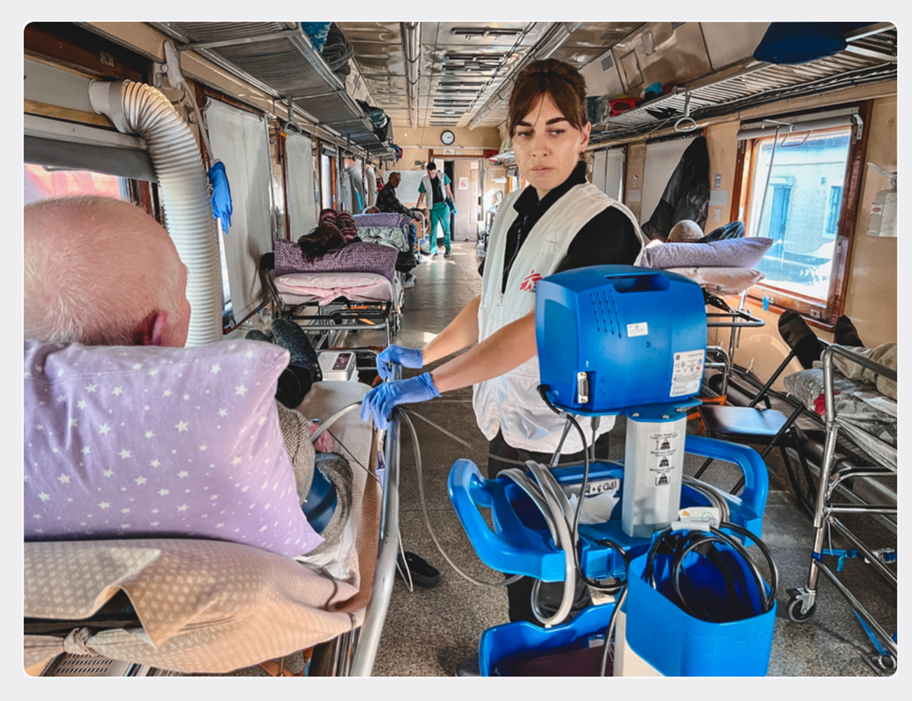
Hospitals near the front lines were attacked one by one, and MSF's medical train evacuated 150 patients to health facilities in safer regions.
The rehabilitation of the elderly left behind
And Tetiana Doloza is one of the evacuated patients.
When the war broke out, like many elderly people, 72-year-old Doroza chose to stay in her hometown because she still had a mother in her 90s to take care of. Unfortunately, war ultimately came knocking on her door.
“On 18 April 2023, I lost my leg. The market where I worked as a salesperson in the city of Ukrainsk, was hit by missiles, and I was severely injured.”
No hospital in the eastern region was able to operate on Tetiana. She was then evacuated by an MSF medical train to the Lviv region in the west.
“I felt lost because I was going alone and didn't know how to cope with an amputation. Although I have only one leg, I must walk, because I have a mother living with a disability,” continued Tetiana
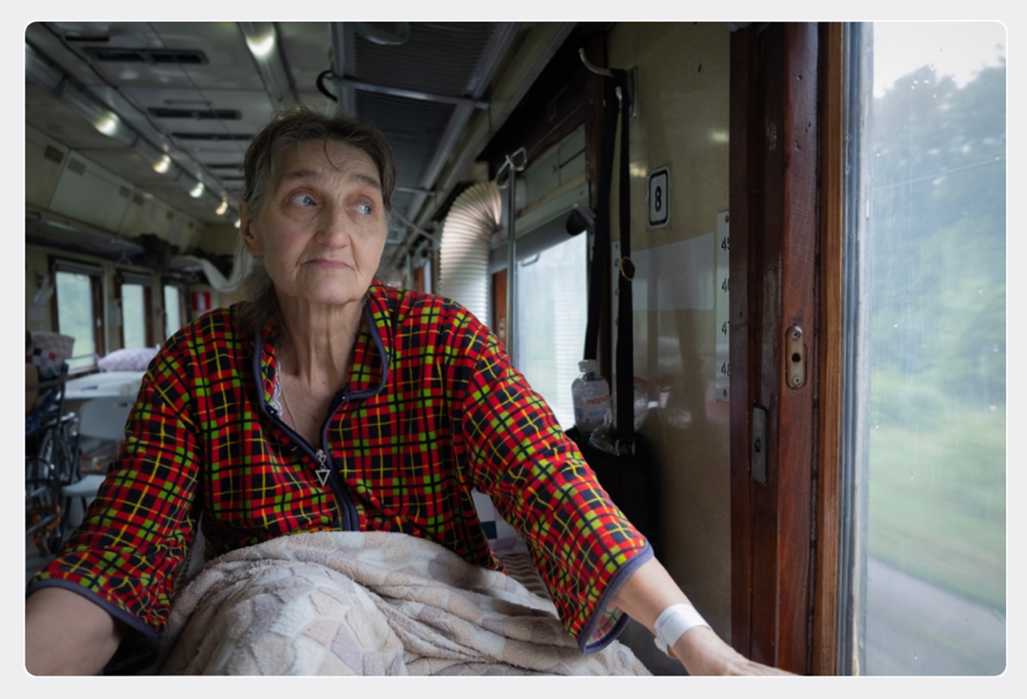
Tetiana Doloza, who lost a foot after being injured by a missile, is being transferred by the MSF medical evacuation train to western Ukraine for surgery.
Tetiana had her foot amputed and replaced by a prosthetic limb. She is learning to walk again in Kyiv.
“Now, I live in Kyiv with my family, and at 72 years old, I am happy to have survived.”
Today, due to a change in the war’s dynamic, patients are now staying in eastern Ukraine, with increasing demand for shorter referrals. MSF continues to operate 15 ambulances that refer patients to safe medical facilities.
Mobile clinics with medical and psychological support for the elderly left behind
Near the Ukrainian front line that stretches for 1,000 kilometers, countless towns were devastated by artillery fire, but many elderly still stay in their homes.
Most of the local medical facilities have been destroyed, and the elderly with chronic illnesses no longer receive medical care. In addition, their homes are in ruins and their loved ones are dead. This has put tremendous pressure on their bodies and minds.
In response, MSF runs mobile clinics in 100 towns and villages near the front line. These clinics usually comprise a therapist, a psychologist, a medical doctor, and a social worker - to address both their medical and psychological needs.
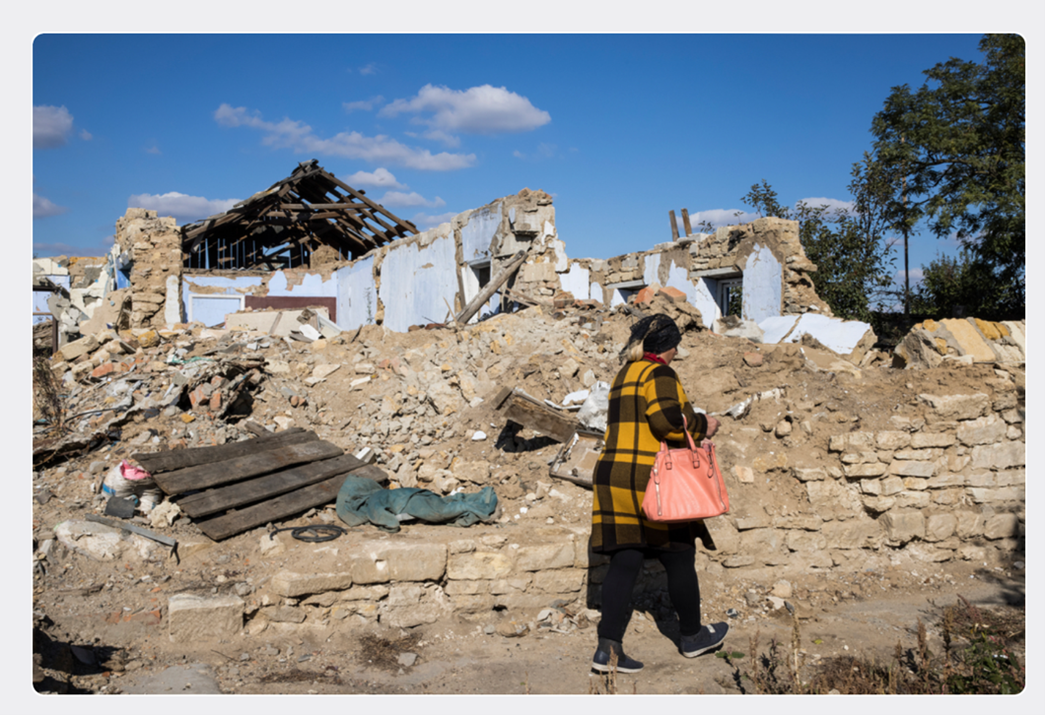
61-year-old Rita Dmitrenko is a cancer patient. The village where she lives is close to the southern front lines, where the neighbourhood has been devastated by the war.
Wandering in the twilight years with terminal illness
Rita Dmitrenko, 61, is a cancer patient from a southern village close to the front line, where the neighbourhood has been devastated by the war. At the height of the war, she and her husband were forced to evacuate 50km away from home for 10 months. In her twilight years, putting her ailing body through displacement, sadness and stress has affected her physical and psychological health.
"I got worse. My husband has depression. When I told him I had cancer, he started to get worse and lose weight."
And along with the war and her cancer came another terrible piece of news: one of her sons died of leukemia. She and her husband were emotional wrecks
The need to be listened to and understood in wartime
In her darkest hour, Rita came to an MSF medical facility - also the only one near the village. Our team not only provides medical care but also psychological consultations. Our psychologists aim to relieve stress and give support tailored to people in emotional distress.
"Everyone here is very grateful to MSF. The medical team took care of us and referred me and my husband to the psychologist. I thought I didn't need psychological help, but it went very well. My husband and I used the counselling they gave us."
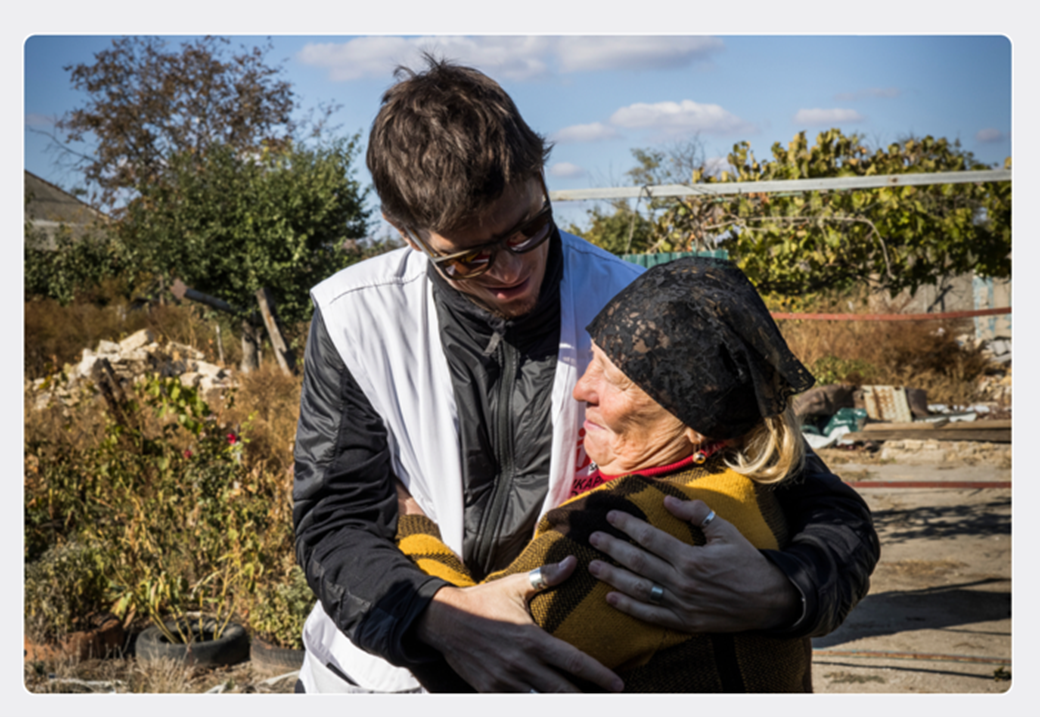
Rita is very grateful to the MSF medical team for helping her and her husband survive the darkest and most helpless time.
“They all need support: to listen to them, to sympathize with them, to hold their hands, even to cry with them,” says Victoria Lepekha, MSF mental health supervisor.
The ravages of war cut far deeper than shelling casualties. The collapse of the medical system left patients extremely vulnerable, and pent-up emotions became psychological trauma, with few aware of these injuries. The war in Ukraine lasted over one thousand days, and the physical and mental destruction caused by the war has yet to end. While the global focus is shifting away, countless Ukrainians still struggle in the ocean of suffering. MSF will continue our work to provide physical and mental relief for Ukrainians.
Forsaken in a Devastating War I am the only one “left” - The muted outcry of orphans in Gaza
"He lost his legs before he could walk."
That was an image etched deep in Dr. Aldo Rodríguez's mind.
A one-year-old child was a bombing victim with injured legs, which Dr. Rodriguez amputated.
Dr. Aldo Rodriguez is a surgeon originally from Mexico. In November 2023, he was sent to Al-Aqsa Shohada Hospital in the Middle Area of Gaza one month after the war broke out.
“Drones and bombings were present 24/7. Every day, two to three times a day, bombs would fall not far away, followed by a rush of injured or dead arrivals at the already overcrowded hospital.”
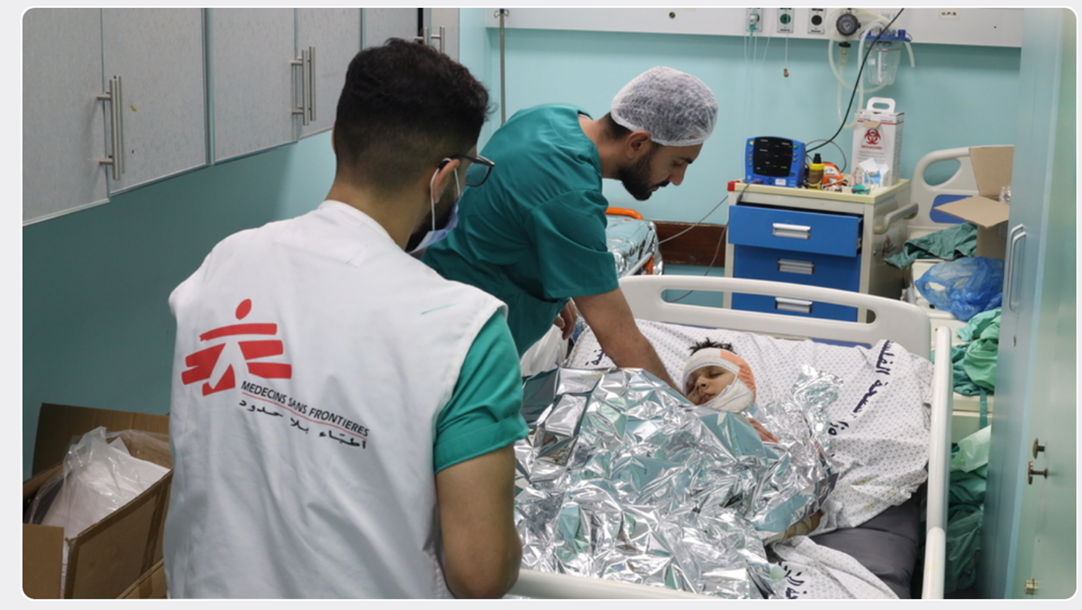
Nearly half of Gaza's population is under the age of 18, which led to many young casualties of war.
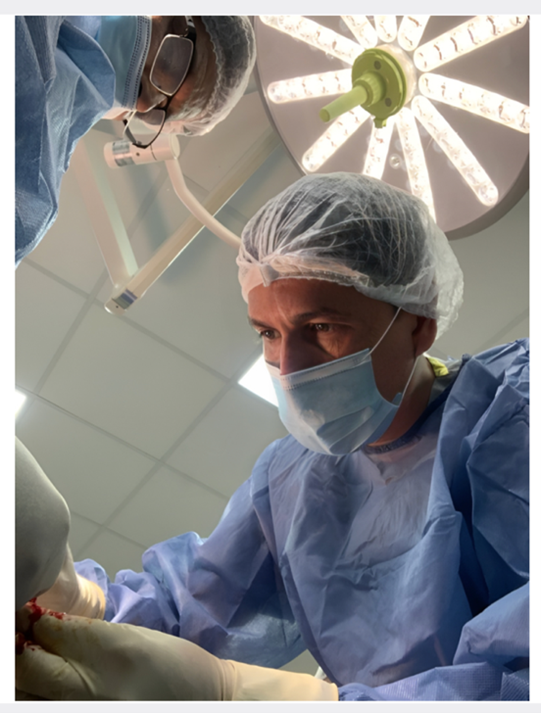
In November 2023, Dr. Aldo Rodriguez arrived at Al-Aqsa
Shohada Hospital in the Middle Area of Gaza. The hospital was so
overcrowded with patients that he had to perform between 20 and
25 surgeries each day.
Wounded child: I am the only one left
One by one, many young patients returned from surgery. Some had a particularly blank stare, sitting silently on the hospital bed with no family by their side, and their medical records all read - WCNSF.
The acronym WCNSF stands for ‘wounded child, no surviving family’. The amputated one-year-old is just one of thousands of WCNSF.
“Every day, I see these children alone and devastated. They are left depressed, not wanting to talk. It's a dramatic situation because it's not just surgery - it’s everything that comes after that. They may get better physically, but mentally they are destroyed.”
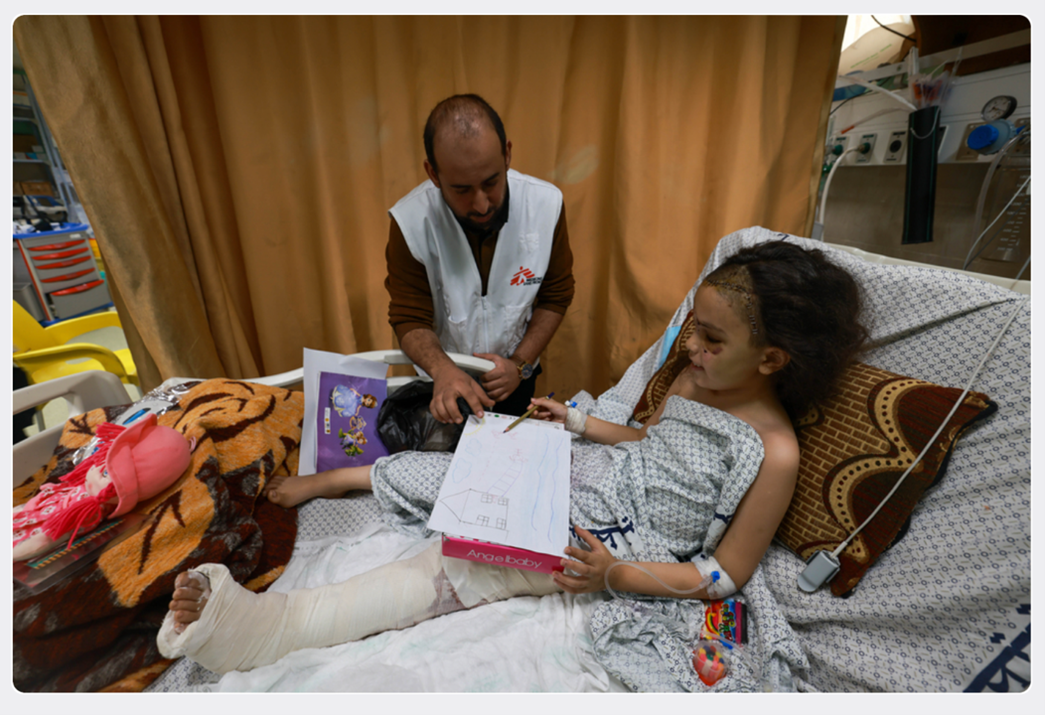
Many casualties of war were children. This young girl lost her whole family in the bombing in which she was injured. She doesn't know her family has been killed.
Medical staff forced to leave 700 patients behind upon evacuation
The sheer number of patients overloaded the hospital. It originally had only 240 beds, to be filled with more than 700 patients. MSF was doing follow up care on orthopedic and reconstructive operations and providing physiotherapy and mental health support.
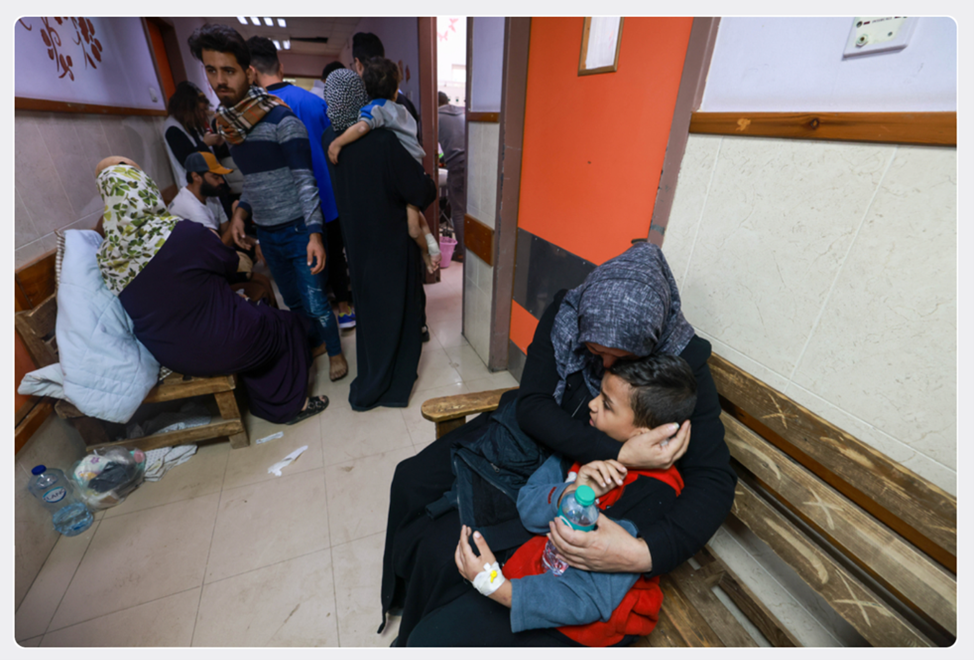
The war-torn medical system could not handle the overwhelming demand for medical care, leaving helpless people crowding the hospital corridors.
Unfortunately, this hospital is no longer operational. In January 2024, the Israeli military issued an evacuation order, and attacks continued near the hospital's vicinity. MSF medical staff were forced to evacuate under extremely threatening conditions, leaving behind more than 700 patients with nowhere to go.
Meanwhile, what happened to this hospital is just the tip of the iceberg.
“We have had to leave 12 different health structures and have endured 26 violent incidents, which include airstrikes damaging hospitals, tanks being fired at agreed deconflicted shelters, ground offensives into medical centres, and convoys fired upon,” says Michel-Olivier Lacharité, MSF Head of Emergency operations.
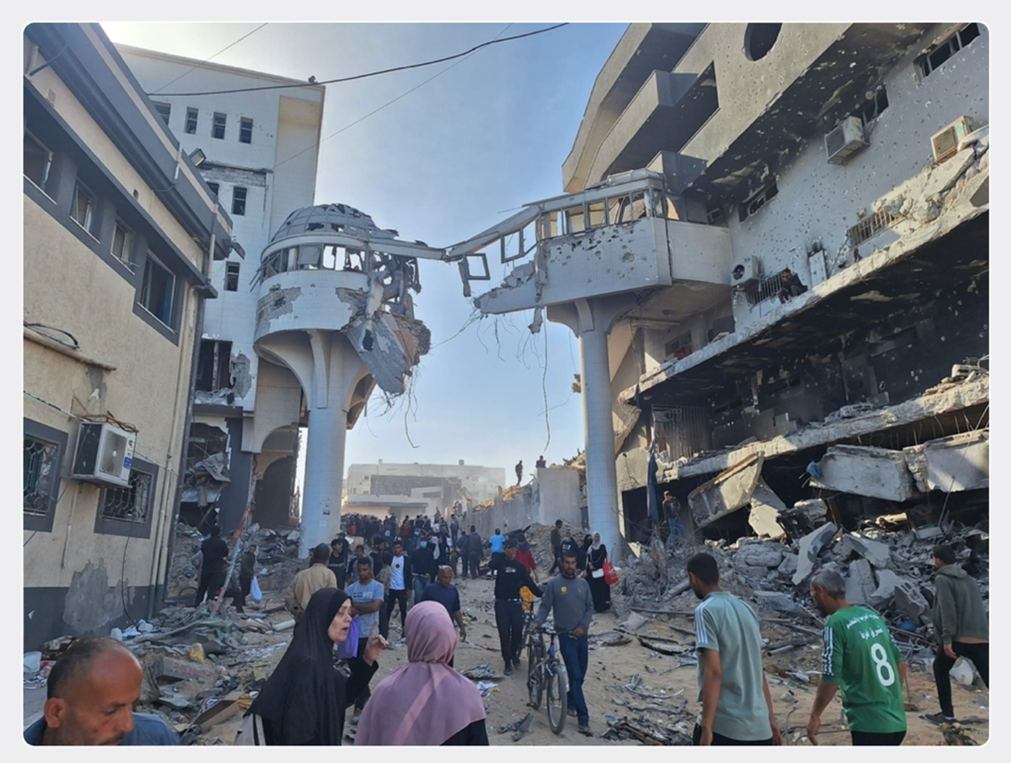
As the largest hospital in northern Gaza, Al Shifa Hospital is in ruins after 14 days of military operations, with more than 100 patients trapped inside.
A devastating war that cut the lifeline
This war in Gaza is unlike previous conflicts. It is completely devastating.
As of May 27, more than 35,000 Palestinians were killed, and more than 80,000* injured. It is estimated that thousands more are buried beneath the ruins. Nearly 2 million people*, or 85% of the population were displaced, with almost half of Gaza's population under 18.

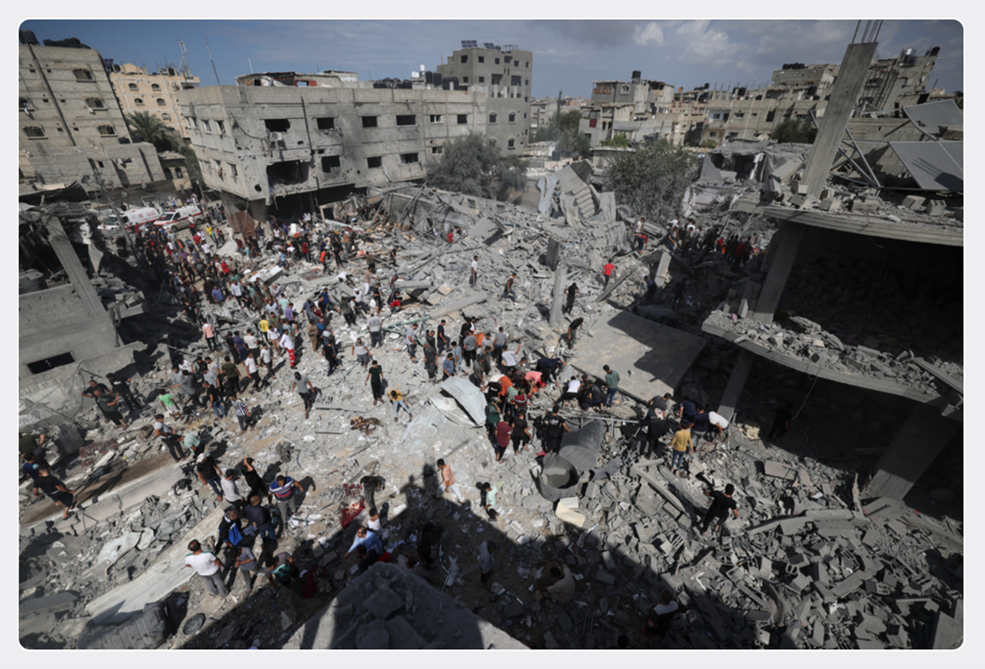
After an air strike, people searched for survivors in the ruins that were Gaza.
Located in southern Gaza, Rafah was a civilian safe zone designated by the Israeli army. Thousands of Palestinians flocked to Rafah to take refuge, making the living space extremely crowded, while water, food, and fuel were hard to come by - a truly dire situation.
Moreover, the Israeli army launched an offensive on Rafah in May. As they controlled the border, the relief supply line aid to Gaza was cut off deliberately.
Since the war broke out, MSF has been delivering 200 tons of medical and humanitarian relief supplies to Gaza every month. With the border closed, it has been even more difficult for relief supplies to enter the Rafah area, pushing civilians to the brink
MSF opts to stay despite facing unprecedented challenges
Despite the challenges, MSF will remain in Gaza, trying to support operational hospitals and establish field hospitals elsewhere in the Gaza Strip. Still, a handful of structures will not be able to cope with a massive influx of wounded civilians.
.png)
This ruthless war has raged on for over six months, leaving people in Gaza living in fear and frustration every day.
2.2 million people in Gaza have endured more than half a year of endless war while living every moment in grief and fear. No one knows if they will survive the next second; no one knows if they can hold on to their families at the end of the war.
